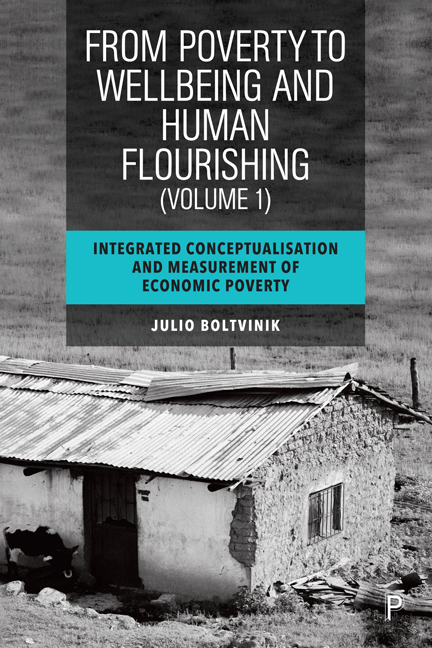 From Poverty to Well-Being and Human Flourishing
From Poverty to Well-Being and Human Flourishing Published online by Cambridge University Press: 28 March 2024
5.1 Poverty measurement
In this chapter I explain the lower part of Table 4.1, which refers to principles and good practices of P measurement.
PPM1 and PPM2: principles of diminishing marginal WB and the existence of a maximum WB
In his major work on the collapse of the facts/values dichotomy, philosopher of science Hilary Putnam (2002) makes a radical criticism of neoclassical economic theory and its normative expression, so-called ‘welfare economics’. He recalls that in the late nineteenth century, neoclassical economists (such as Jevons and Marshall) adopted the concept of utility, assumed that it could be quantified, and drew utility curves whose shape was determined by the Law of Diminishing Marginal Utility (LDMU), which holds that the utility derived from the consumption of the last unit of a given good diminishes as consumption increases. In Welfare Economics (1920), Putnam adds, Pigou argued that money and income (Y) are also subject to the LDMU. Based on this, Pigou formulated the thesis that the reduction of Y inequality increases social welfare, since total social utility (or happiness) would increase if one withdrew a thousand dollars from a millionaire and gave them to a destitute person.
Such a subversive thesis, however, could not last in academia (which tends towards an apology of the status quo). Putnam relates that, in 1938, Lionel Robbins convinced all mainstream economists that interpersonal comparisons of utility lack any significance. He maintained that rational discussion in the domain of ethics is impossible and that, therefore, ethical issues should be kept completely outside economic theory. Thus, in a single stroke, the idea that economists could and should be concerned with social WB in an evaluative sense was rejected. The dichotomy between facts and values was taken to the limit in Robbins’ statement: ‘It does not seem logically possible to associate the two studies [ethics and economics] in any form but mere juxtaposition. Economics deals with ascertainable facts; ethics with valuation and obligations’ (Robbins, 1932, p 134, quoted by Putnam, 2002, p 54). Putnam goes on to say that economists, convinced by Robbins’s ideas, instead of abandoning the discipline of welfare economics, sought – however strange this may seem – a criterion of optimal economic functioning that was value-neutral and found it in the notion of the Pareto optimal.
To save this book to your Kindle, first ensure [email protected] is added to your Approved Personal Document E-mail List under your Personal Document Settings on the Manage Your Content and Devices page of your Amazon account. Then enter the ‘name’ part of your Kindle email address below. Find out more about saving to your Kindle.
Note you can select to save to either the @free.kindle.com or @kindle.com variations. ‘@free.kindle.com’ emails are free but can only be saved to your device when it is connected to wi-fi. ‘@kindle.com’ emails can be delivered even when you are not connected to wi-fi, but note that service fees apply.
Find out more about the Kindle Personal Document Service.
To save content items to your account, please confirm that you agree to abide by our usage policies. If this is the first time you use this feature, you will be asked to authorise Cambridge Core to connect with your account. Find out more about saving content to Dropbox.
To save content items to your account, please confirm that you agree to abide by our usage policies. If this is the first time you use this feature, you will be asked to authorise Cambridge Core to connect with your account. Find out more about saving content to Google Drive.